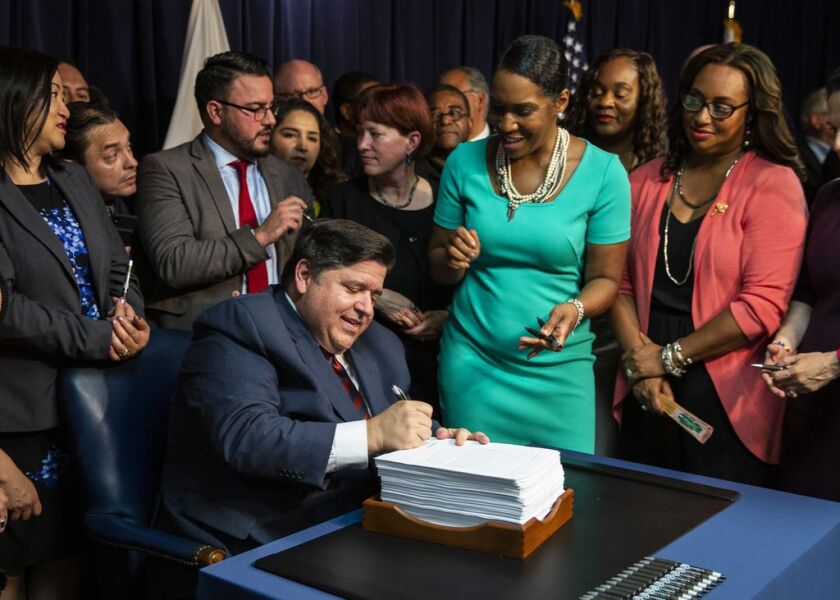Whenever I’ve spoken with Democratic political types over the last couple months, I’ve asked them what they’re picking up from voters about the prospects for the graduated income tax referendum.
The answer is usually the same: They’re worried that it’s not going to be approved.
None of them have predicted it will lose, mind you, and they’re not giving up, but they’re definitely not feeling confident about its passage.
They see what I see: Opponents of the constitutional amendment have done a masterful job of sowing doubt and confusion while playing into the voting public’s natural mistrust of “Springfield politicians.”
That’s a shame because the issue really isn’t that complicated, and you don’t need to trust anybody else to see what’s in your own self-interest.
Since Illinois approved an income tax in 1969, the state has employed a flat tax system under which everyone is taxed at the same percentage rate, currently 4.95%.
Gov. J.B. Pritzker and the Democratic-controlled Legislature are proposing to switch to a system with progressively higher tax rates depending on your level of income, similar to what we already have with the federal income tax.
Making that change requires an amendment to the state constitution.
Separate from the constitutional amendment, Democrats have approved legislation laying out how they would initially implement such a graduated tax system.
Their plan, which won’t take effect unless the constitutional change is approved, would raise taxes on taxpayers with annual income exceeding $250,000. They say that’s about 3% of Illinois taxpayers.
The other 97% of taxpayers would either receive a tax cut or pay at the same rate they do now.
Individual rates would range from 4.75% for persons making less than $10,000 to 7.99% for someone making more than $750,000.
It’s true this would result in a tax hike of about $3.4 billion, but 97% of you won’t be paying it.
The main argument against changing the constitution is that a future Legislature could then alter the brackets to raise taxes on the middle class.
That’s true. They could do that. And I think you can safely assume those brackets won’t stay the same until the end of time, maybe not even until the end of the decade.
Of course, legislators can also raise income taxes now, and the main safeguard you will have is what it’s always been: their fear of voter backlash. That doesn’t change.
What legislators can’t do now, under the existing constitution, is to make wealthier people pay a higher percentage rate, and that’s why wealthier people are fighting very hard to keep this change from being made.
I try to understand why people in the middle wouldn’t like a graduated tax, and the only thing I can see is that they are worried someone making less money is going to get a better deal than them.
It baffles me that anyone in this age of growing income inequality would continue to see themselves as having more in common with the wealthy than the poor — when most of us are just one health catastrophe or job loss from gravitating to the bottom of the heap, yet light-years from catching up to the ultra-rich. But that’s America 2020, God help us.
Despite what opponents are saying, there’s nothing in this constitutional amendment that would tax retirement income. There’s also nothing that would make it easier to tax retirement income. That’s just a red herring thrown out there to confuse you.
Taxing retirement income is an idea occasionally advanced by some Democrats as well as Republicans and then just as quickly shot down by the majority of legislators who know it would be very unpopular with older voters especially.
Maybe the best argument against a graduated income tax is that it doesn’t really solve Illinois’ financial problems. That’s true, too. It doesn’t. Our problems are bigger than that.
But this is a good step in the right direction. If we’d had a more responsive tax system all along that did a better job of capturing wealth based on ability to pay, we might have had a better chance of avoiding the mess we’re in, not that it would have prevented those unfunded pensions.
Opponents of a graduated income tax have one built-in advantage. It’s tough to pass a substantive constitutional amendment in Illinois, requiring approval either by 60% of those voting on the question or more than 50% of everyone casting a ballot in the election.
With all the millions of dollars being spent to persuade people to vote one way or another on this important matter, I don’t have any illusions I can influence the outcome.
But I wouldn’t want there to be any doubt that I’m a firm “Yes.”






